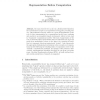Free Online Productivity Tools
i2Speak
i2Symbol
i2OCR
iTex2Img
iWeb2Print
iWeb2Shot
i2Type
iPdf2Split
iPdf2Merge
i2Bopomofo
i2Arabic
i2Style
i2Image
i2PDF
iLatex2Rtf
Sci2ools
135
click to vote
NC
2010
2010
Representation before computation
My main objective is to point out a fundamental weakness in the conventional conception of computation and suggest a promising way out. This weakness is directly related to a gross underestimation of the role of object representation in a computational model, hence confining such models to an unrealistic (input) environment, which, in turn, lead to “unnatural” computational models. This lack of appreciation of the role of structural object representation has been inherited from logic and partly from mathematics, where, in the latter, the centuries-old tradition is to represent objects as unstructured “points”. I also discuss why the appropriate fundamental reorientation in the conception of computational models will bring the resulting study of computation closer to the “natural” computational constrains. An example of the pertinent, classoriented, representational formalism developed by our group over many years—Evolving Transformation System (ETS)—is briefly outline...
Appropriate Fundamental Reorientation | Computational Models | NC 2010 | Neural Networks | Object Representation |
Related Content
| Added | 29 Jan 2011 |
| Updated | 29 Jan 2011 |
| Type | Journal |
| Year | 2010 |
| Where | NC |
| Authors | Lev Goldfarb |
Comments (0)

